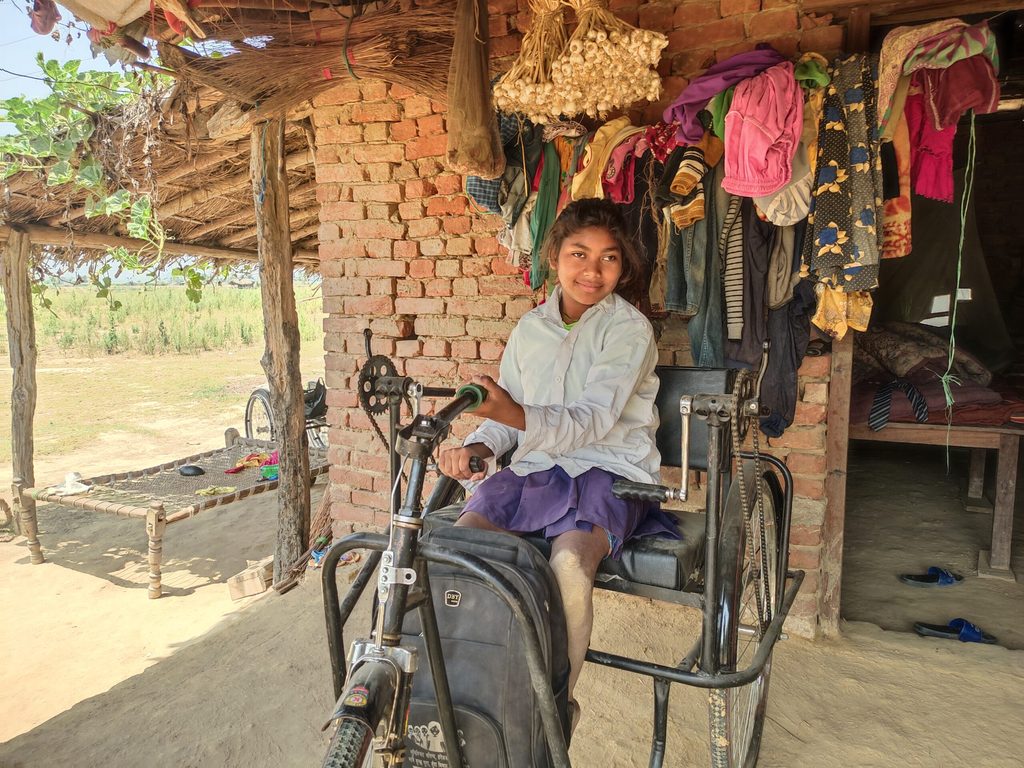Tricycle helps girl with disability access education
Saraswoti is determined to get a good education to build a better future for her family despite her disability. She now has a tricycle to help her get to, from, and around school.

Saraswoti, 13, lives in a small village in Bardiya district in Nepal. She was born with a profound disability which restricts her mobility. Despite these challenges, she made sure she went to school every day using a rusty old wheelchair.
Saraswoti’s father is the sole breadwinner, supporting his large family on the little he manages to earn each day. “I am a labourer, but I rarely get work as I do not have the skills. If I find work, I earn about NRP 500 (€4) per day. This is not enough to feed my family of 6.”
Her mother spends her days taking care of her daughter who she has to accompany to school. “Saraswoti is not able to do her daily routine by herself. She is my eldest daughter and I also have to cook, feed, clean, and look after my 3 other daughters,” she says.
The family owns a small plot of land on the bank of the Bhada River. They have a small hut on the land where they live, however, both the land and house are prone to flooding every year.
Education brings hope of a better future
Despite all these obstacles, Saraswoti is determined to go to school every day. “She has not been absent for a single day since she joined the school,” says her mother proudly.
Saraswoti says she wants to finish her education so she can get a good job. “I want to become a senior government official working for girls with disabilities like me,” she says. “It is difficult for me to use the wheelchair to go to school. I have to travel 4 kilometers every day to reach school, crossing roads which are in bad condition.”
The principal of Saraswoti’s secondary school says that she is one of their best students. “She is determined and confident. She is very vocal about her condition and raises concerns about our school’s need to be disability friendly.”
“It is difficult for me to use the wheelchair to go to school.”
Saraswoti
The infrastructure and facilities at the school are the biggest challenges that Saraswoti faces in accessing education. The school does not have a ramp, so her mother has to carry her to class which is on the first floor. The toilets are not disability friendly either.
“Looking at the condition of my school, I want to change the situation for other girls with disabilities in the future by becoming a senior government official who has the power to make decisions,” Saraswoti says.
“I am proud of my daughter,” shares Saraswoti’s mother. “At a young age, she is well informed about her rights. She recently went to her principal to request a tricycle for her to use instead of the wheelchair.”
“Using the wheelchair exhausts me,” explains Saraswoti. “I am already tired by the time I reach school. In this condition, I am not able to concentrate on my studies. I am hoping a tricycle would ease my struggles.”
Tricycle improves access to school
When they received Saraswoti’s request for a tricycle, the school management committee submitted a written request to the Gulariya Municipality Child Welfare Office and Child Rights Committee. The committee sent a letter of recommendation to Banke UNSECO Club, one of Plan International’s working partners in the area.
After reviewing Saraswoti’s situation, Plan International agreed to provide her with a tricycle as part of our work to address the root causes of gender inequality which prevents girls, particularly those with disabilities, in western Nepal from completing their education.
Saraswoti was on cloud 9 when she was invited by the Child Welfare Office to receive her new tricycle. “I am happy today as I can see my dreams being fulfilled. This has motivated me to prioritise my education,” she shares.
“She has never dropped out of school, and now with this tricycle, she is more excited than ever to keep attending her classes,” says Saraswoti’s mother who was also selected to receive training to learn new skills that she can use to earn income.
Categories: Education


